Queens of Their Hives
A network of Mayan women produce melipona honey and protect biodiversity in Mexico
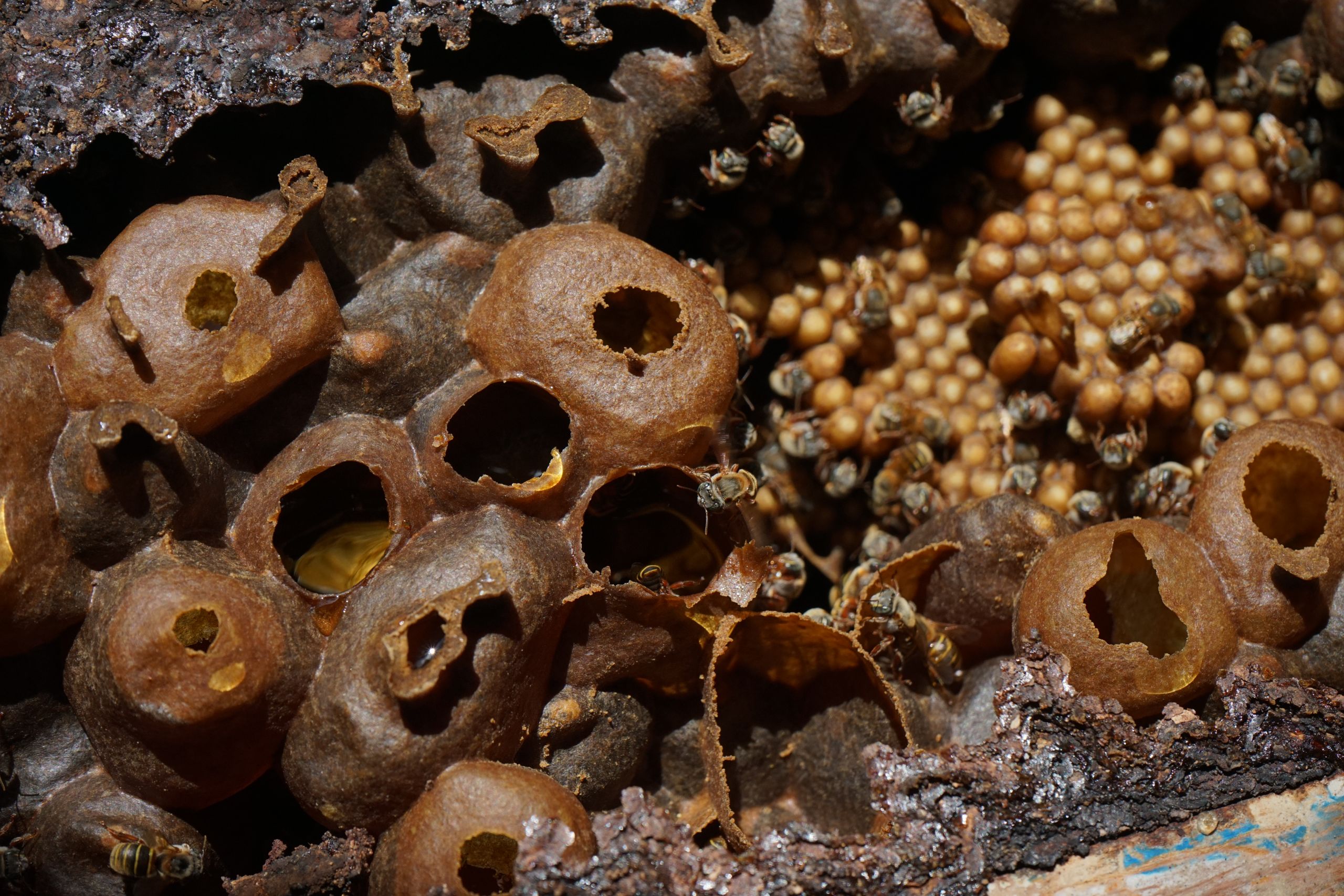
In the Mexican state of Yucatán, a group of Mayan women are the world’s largest producers of rare melipona honey, produced by a genus of neotropical stingless bees unique to Latin America. The workers have organised themselves into a co-operative network to strengthen their capacities and jointly face entrepreneurship challenges as caretakers of these indigenous bees.
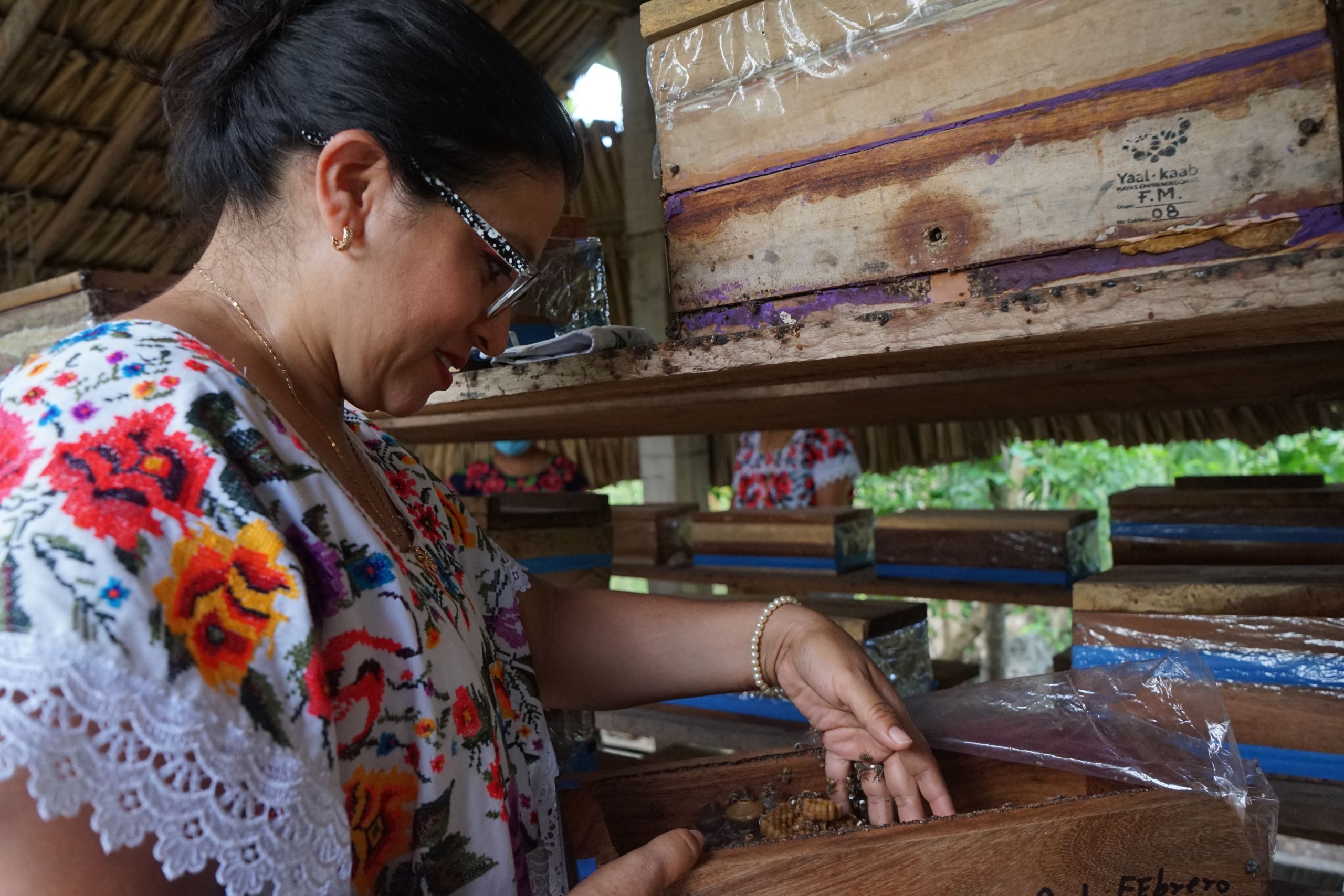
A member of the network, Gabriela Góngora Espejo shows a box with melipona bees. Photo: © UNDP Mexico, SGP Mexico, Claudia Novelo Alpuche
"Before, we didn't have much knowledge about meliponiculture. There are many things that we did not know, but through these trainings that we have taken, they have helped us a lot. We have changed our lives, because before we were only embroiderers. How much did we earn [back then]? Very little, there were no more resources. On the other hand, now I have changed a lot as a person", remarked Fany Argüelles Parra.
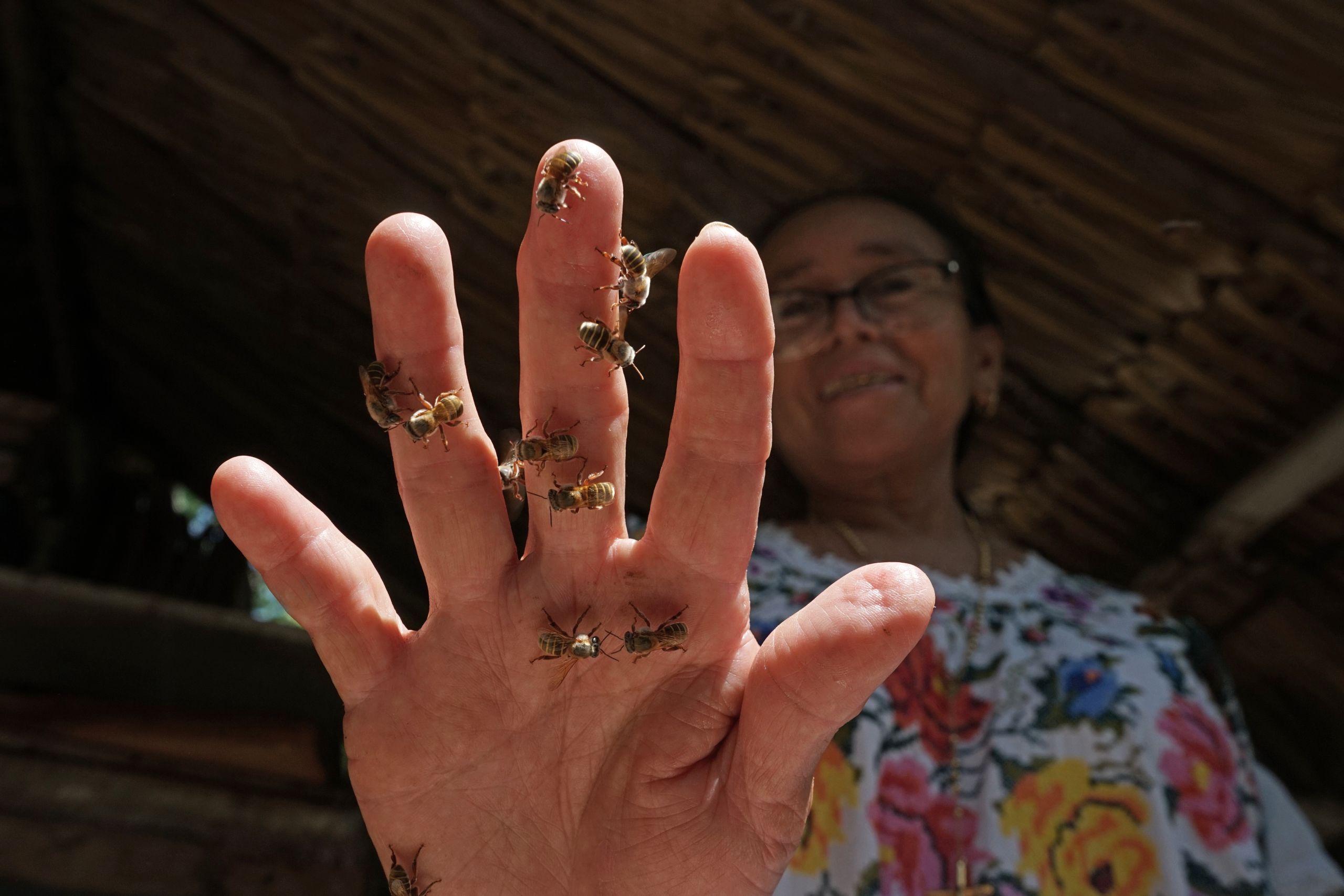
Fany Argüelles Parra shows her hands covered in melipona bees, which are stingless. Photo: © UNDP Mexico, SGP Mexico, Claudia Novelo Alpuche
She and 96 other Mayan women are part of the Kuxtalil co-operative network, which represents 12 producer’s groups across nine locations in the Yucatán towns of Maní, Dzan, Oxkutzcab, Teabo, Chacsinkín, and Tekax.
The melipona bee, or Xunán kab, as it is called in the Mayan language, produces a honey with medicinal properties that has been used since ancient times in the Mayan culture.

A member of the network, Gabriela Góngora Espejo shows a box with melipona bees. Photo: © UNDP Mexico, SGP Mexico, Claudia Novelo Alpuche
A member of the network, Gabriela Góngora Espejo shows a box with melipona bees. Photo: © UNDP Mexico, SGP Mexico, Claudia Novelo Alpuche

Fany Argüelles Parra shows her hands covered in melipona bees, which are stingless. Photo: © UNDP Mexico, SGP Mexico, Claudia Novelo Alpuche
Fany Argüelles Parra shows her hands covered in melipona bees, which are stingless. Photo: © UNDP Mexico, SGP Mexico, Claudia Novelo Alpuche
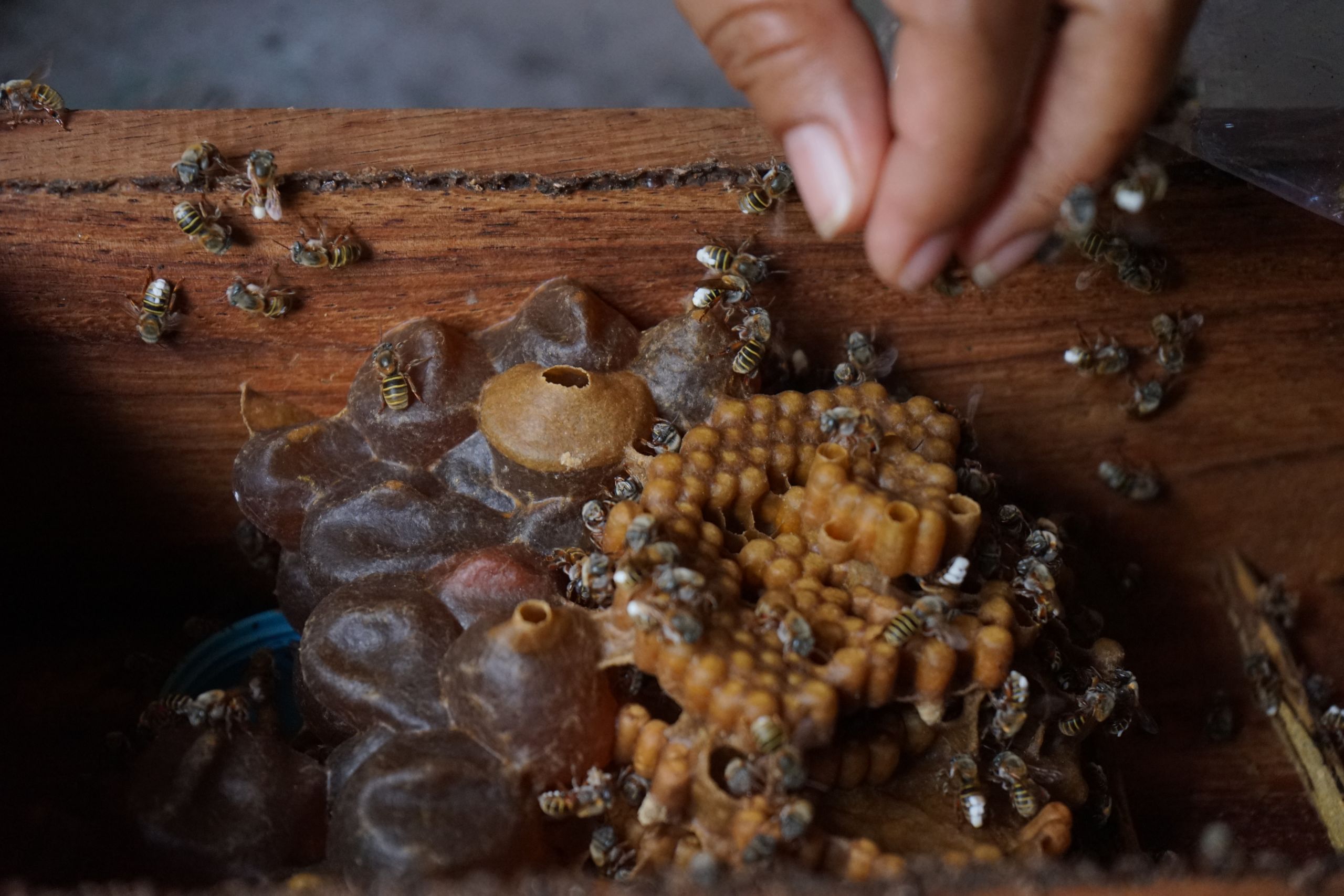

Gift of Life
“The bees have taught us a lot, because they always work as a team and achieve great things. We hope that by joining this network, we, as women, can achieve great things together as well,” noted Julia Daniela Ku Tzuc, from the Melipona bee colony in Maní, Yucatán.
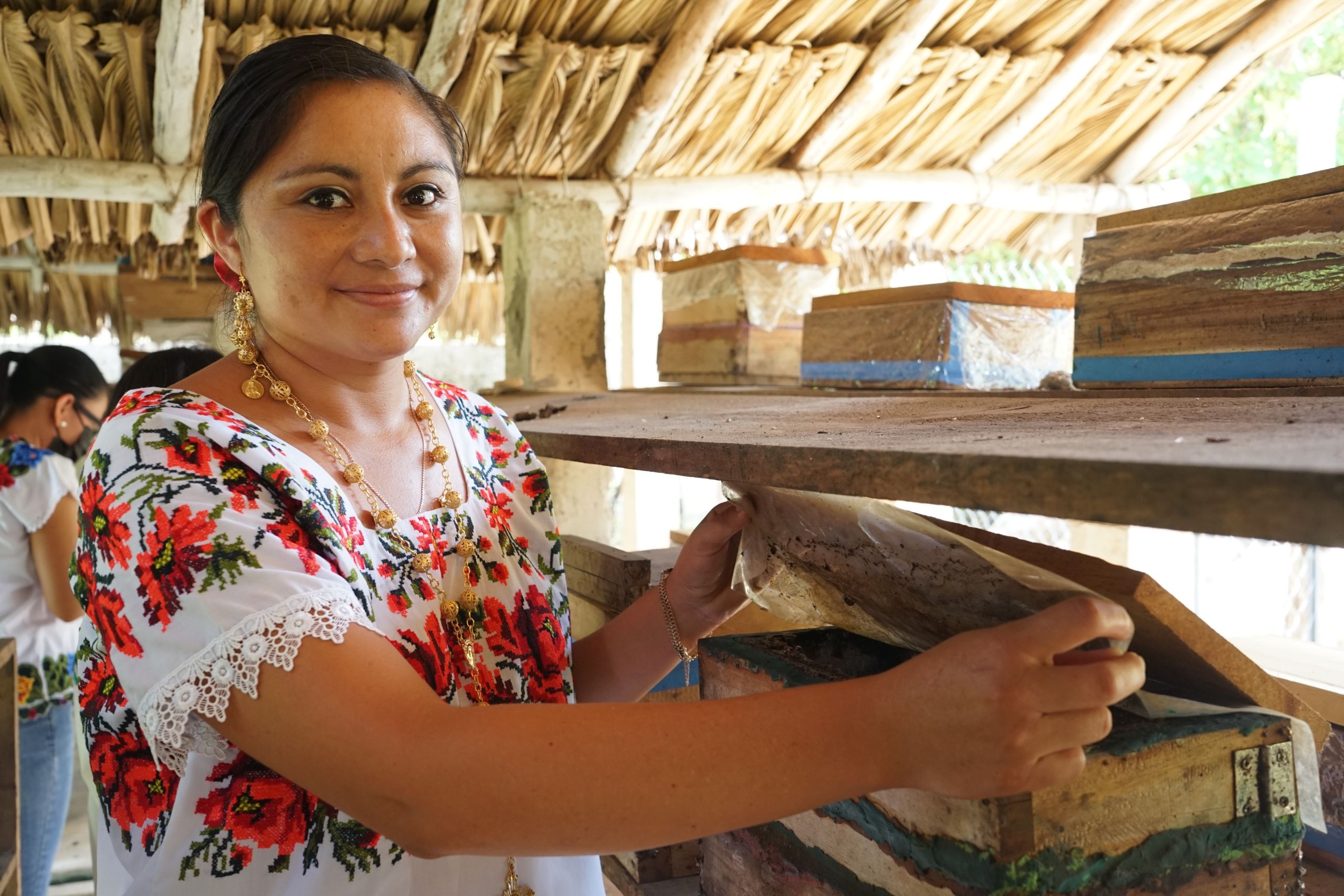
Julia Daniela Ku Tzuc, from the Melipona bee colony in Maní, Yucatán. Photo: © Claudia Novelo Alpuche/UNDP Mexico, SGP Mexico.
As women, they have often been excluded from development opportunities, so part of the network's efforts has focused on implementing informational workshops, on topics including human development, production, organisation, commercialisation, and administration. These efforts help build capacity, maintain production, bolster management, and engender a recognition among the women that they can serve as agents of change in their communities.
"Kuxtalil in maya means gift of life. Before we were just housewives. This network has opened the way for us. It is a way of seeing the world differently. At first, we only took care of the children, but thanks to the training – because they have the courage to talk about self-esteem – they have made us see that women can achieve many things."

Julia Daniela Ku Tzuc, from the Melipona bee colony in Maní, Yucatán. Photo: © Claudia Novelo Alpuche/UNDP Mexico, SGP Mexico.
Julia Daniela Ku Tzuc, from the Melipona bee colony in Maní, Yucatán. Photo: © Claudia Novelo Alpuche/UNDP Mexico, SGP Mexico.
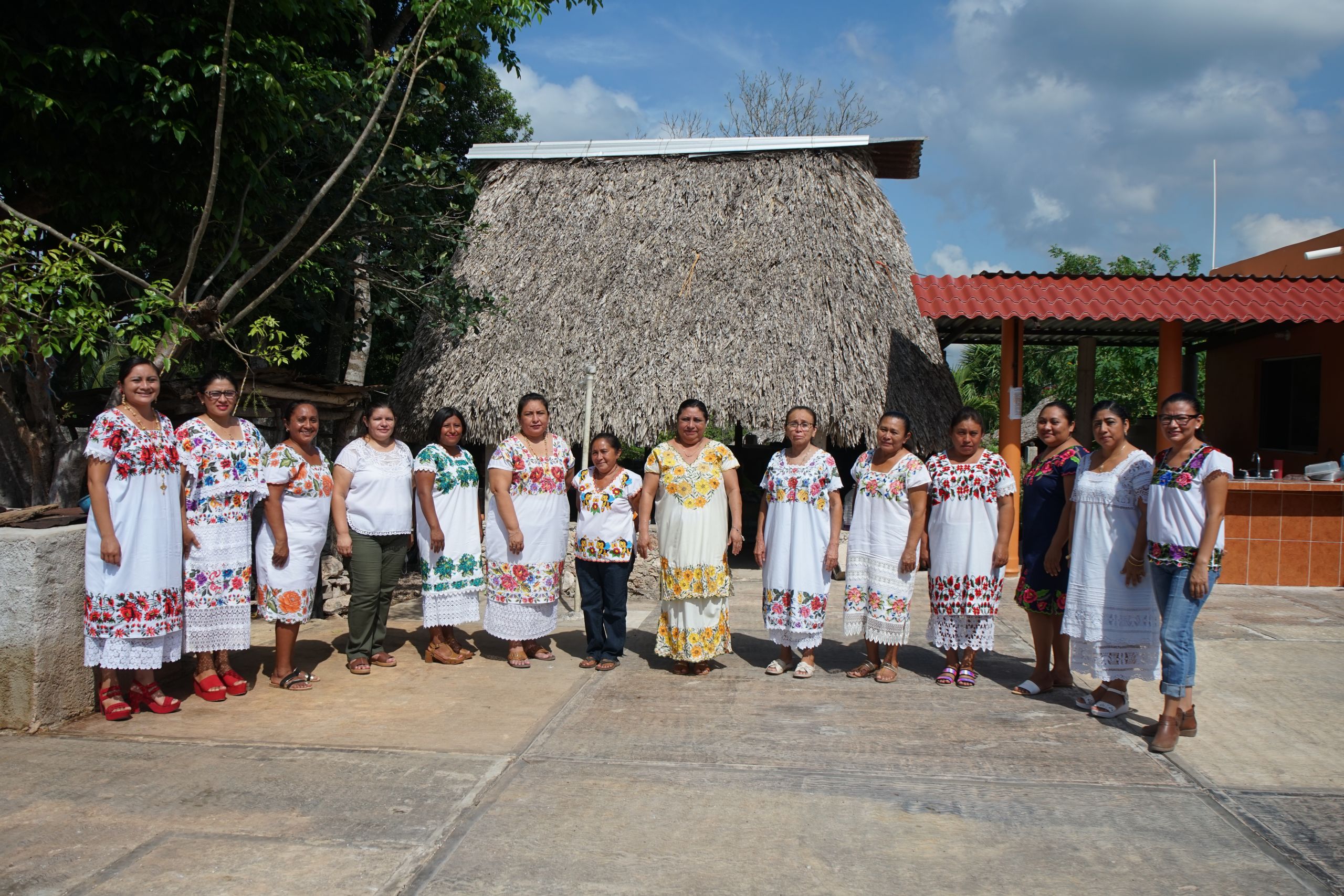
The network of Mayan women producing melipona honey and conserving biodiversity in Mexico. Photo: © UNDP Mexico, SGP Mexico, Claudia Novelo Alpuche
The network of Mayan women producing melipona honey and conserving biodiversity in Mexico. Photo: © UNDP Mexico, SGP Mexico, Claudia Novelo Alpuche
Precious bees
Unlike the classic honey bee - Apis mellifera - the hives of the Melipona beecheii are placed in boxes or jobones - traditional Mayan log structures. Because the bees are stingless, the jobones can be installed near homes and in vacant lots. The presence of the bees provides multiple benefits, from traditional use of the honey for its medicinal properties, as well as a significant economic potential from its sale and export use, as melipona honey is less likely to crystallise than its better-known alternatives.
“Personally, the main benefit is independence. Before we were financially dependent on our husbands, but now we depend on ourselves and our children also depend on us.”
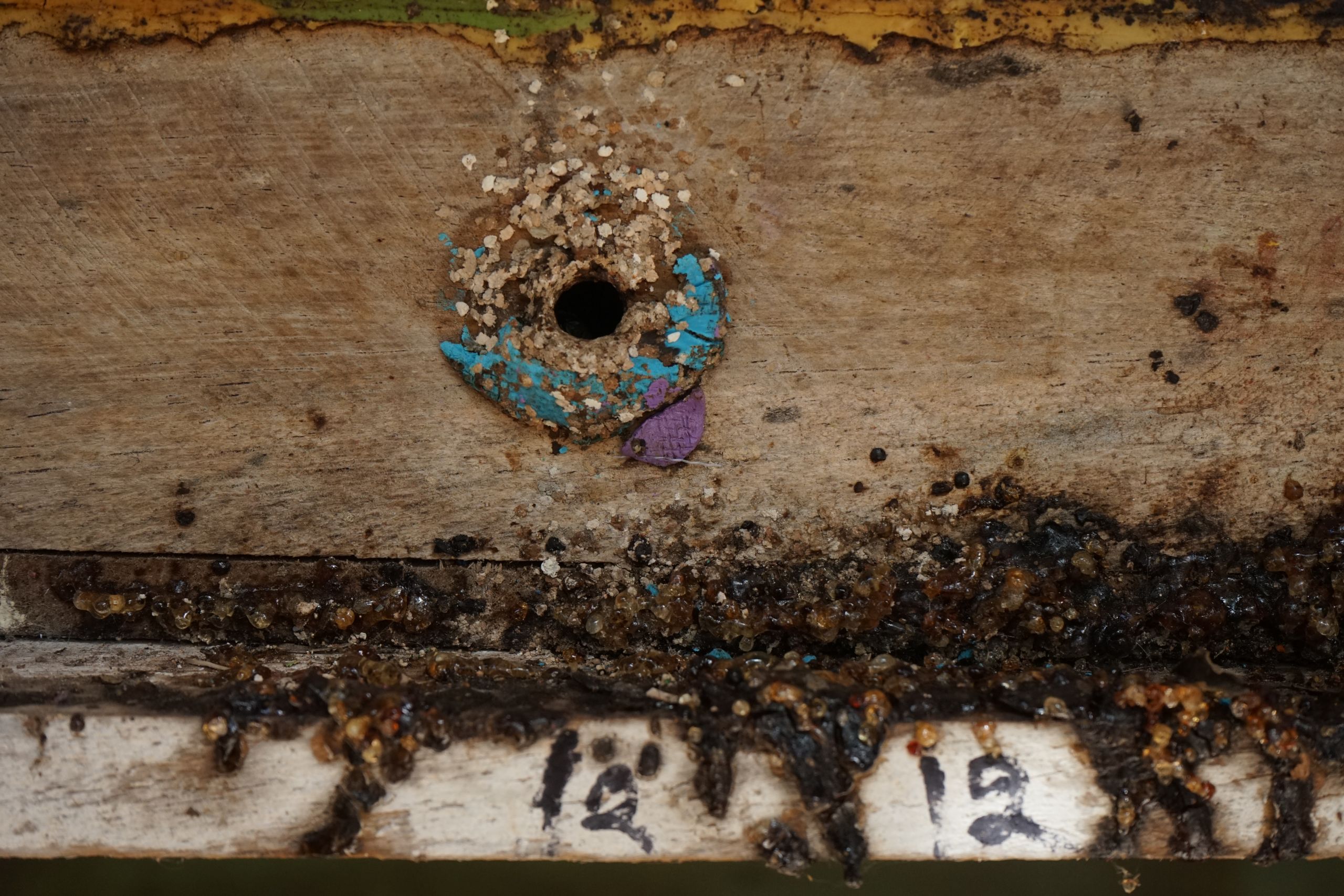
Honey heals
In addition to selling honey through the co-operative’s Yaal-Kab brand, the members have developed personal hygiene and beauty products including soaps, body and facial creams, and shampoos.
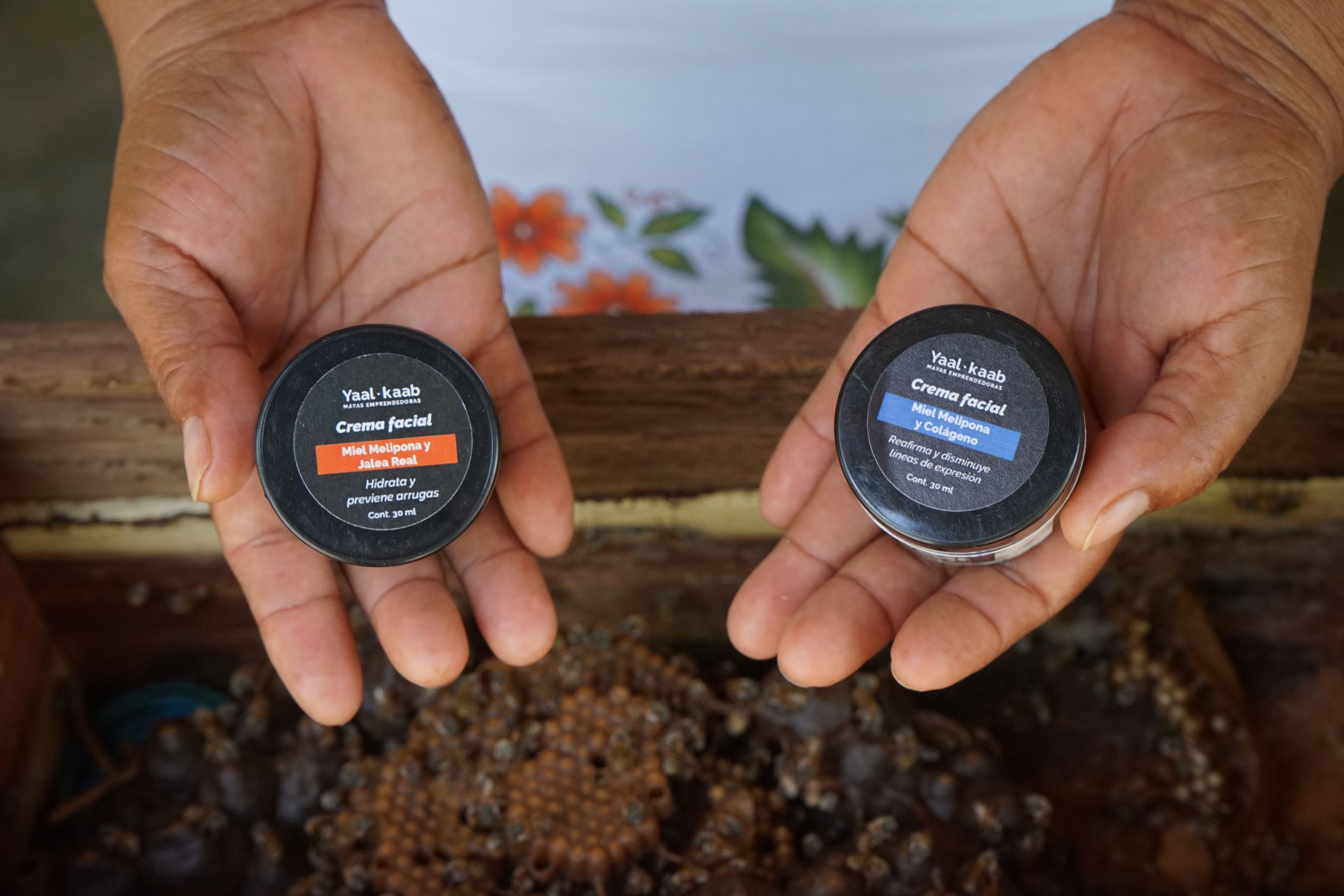
Meliponiculture provides many economic opportunities, such as the development of personal hygiene and beauty products like these facial creams. Photo: © UNDP Mexico, SGP Mexico, Claudia Novelo Alpuche
The objective of the brand is to provide marketing opportunities to the subsidiary producers, since one of the main obstacles to selling melipona honey or its products is the lack of access to markets. For these women, establishing trust with customers is a priority in order to render this less-known specialty honey financially viable.

Meliponiculture provides many economic opportunities, such as the development of personal hygiene and beauty products like these facial creams. Photo: © UNDP Mexico, SGP Mexico, Claudia Novelo Alpuche
Meliponiculture provides many economic opportunities, such as the development of personal hygiene and beauty products like these facial creams. Photo: © UNDP Mexico, SGP Mexico, Claudia Novelo Alpuche
Since 2018, the Global Environment Facility’s Small Grants Programme (SGP), which is implemented by the United Nations Development Program (UNDP), has been supporting the co-operative with materials and equipment to establish processing centres that guarantee quality production, so that customers can benefit from the honey’s unique properties, which in turn leads to the promotion of biodiversity conservation.
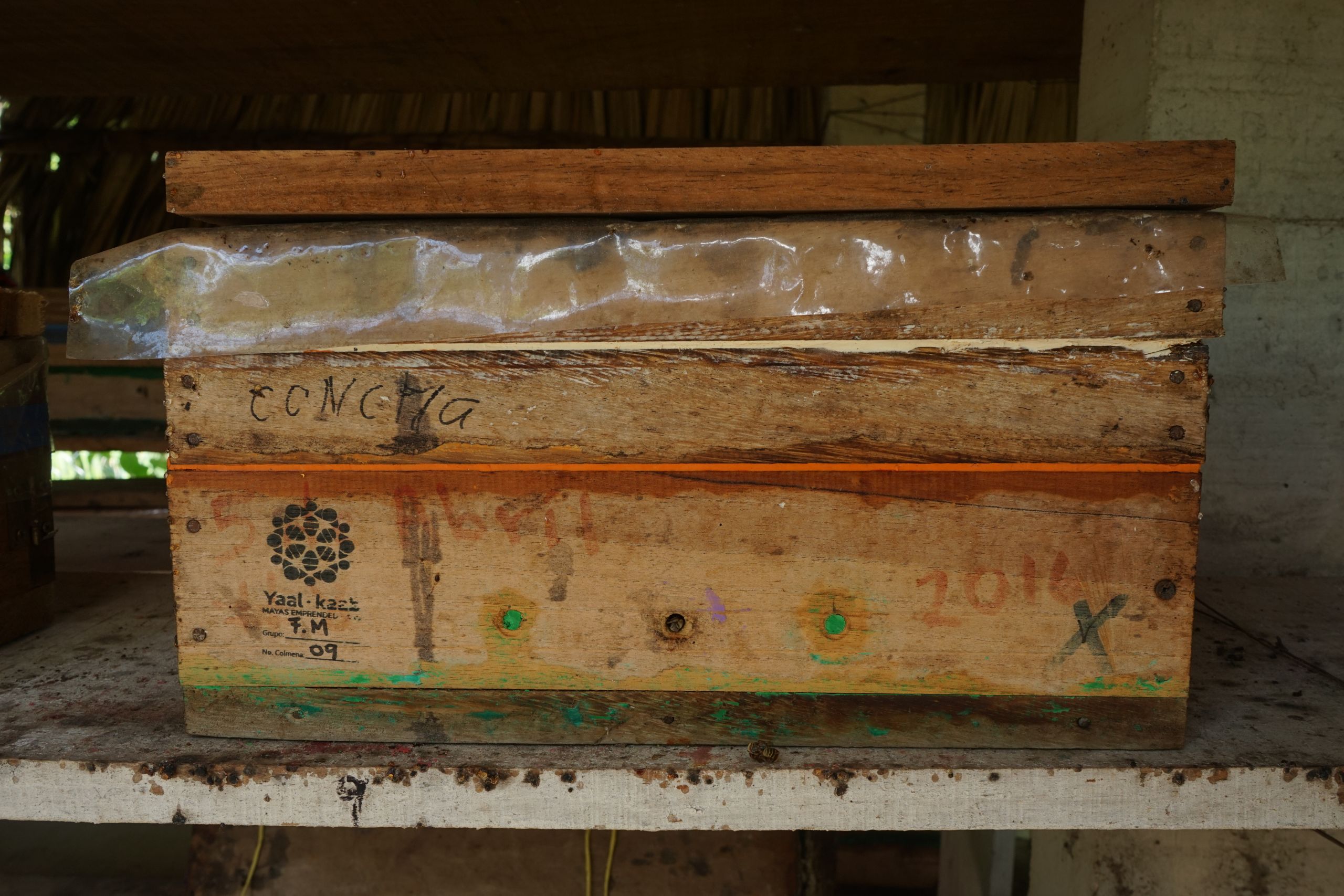
A box where the the hives of the Melipona beecheii are kept. Photo: © UNDP Mexico, SGP Mexico, Claudia Novelo Alpuche
“When we started, we wanted to learn everything about the bee, but it was difficult because of its high cost. But thanks to the fact that we joined the network and got trained, we obtained eight hives.”
Lack of consumer familiarity with their products and the risks of counterfeit honey are not the only threats the women have faced.
The 2020 hurricane season in the Yucatán Peninsula brought tropical storms and torrential rains, generating temporary losses for nearly every network member. Soila Aquino says that of the 56 boxes they had before the floods, they were only able to rescue 17, a significant setback.
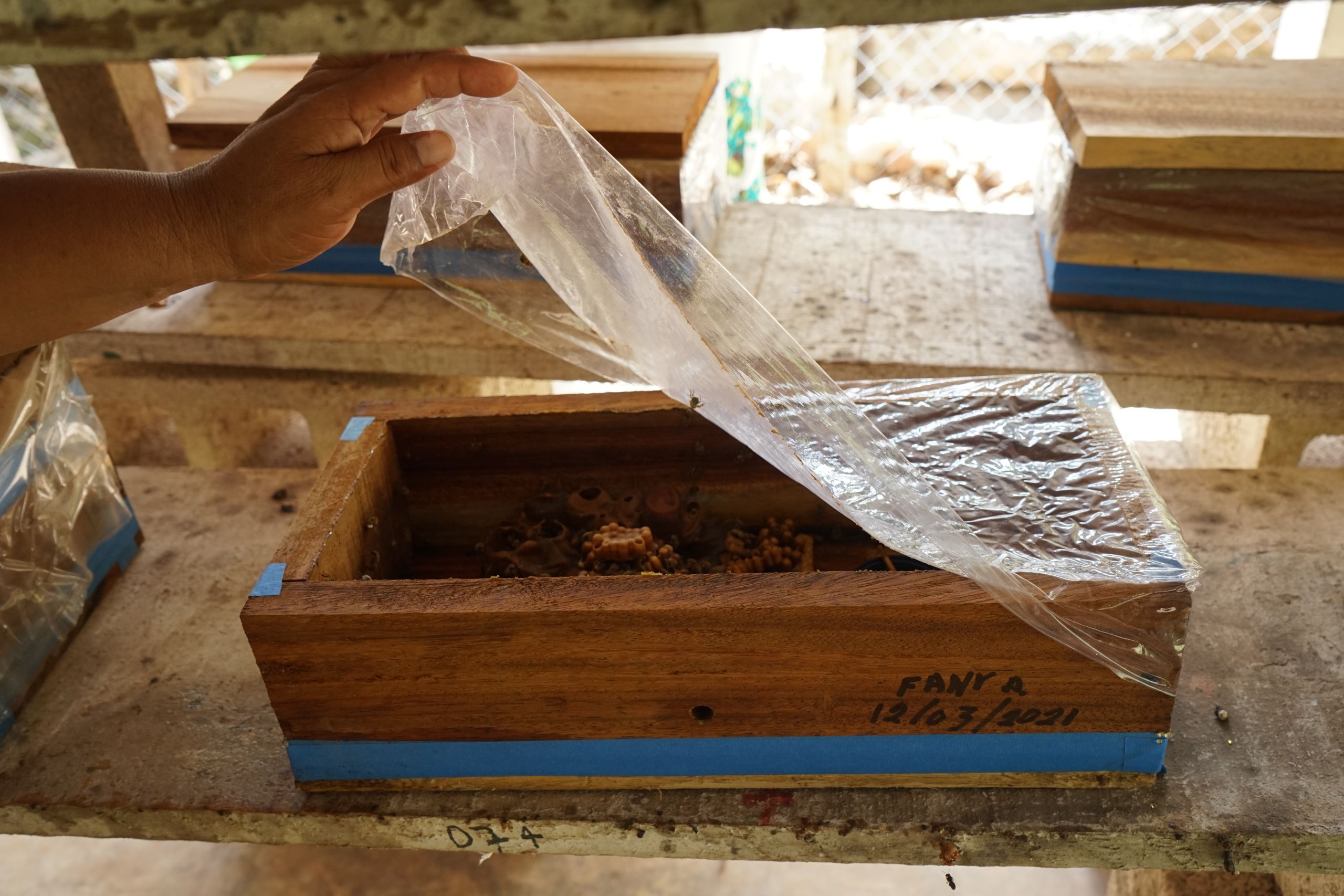
Soila Aquino says that, of the 56 boxes they had before the floods, they were only able to rescue 17, losing almost all their progress.
“But thanks to the recovery project and the support from SGP, we have been able to move forward. With training we learned to divide hives and take full advantage of the honey, so now we have 26 jobones. Now we are ready, and we know where to put the bees in case a storm comes to avoid damage.”
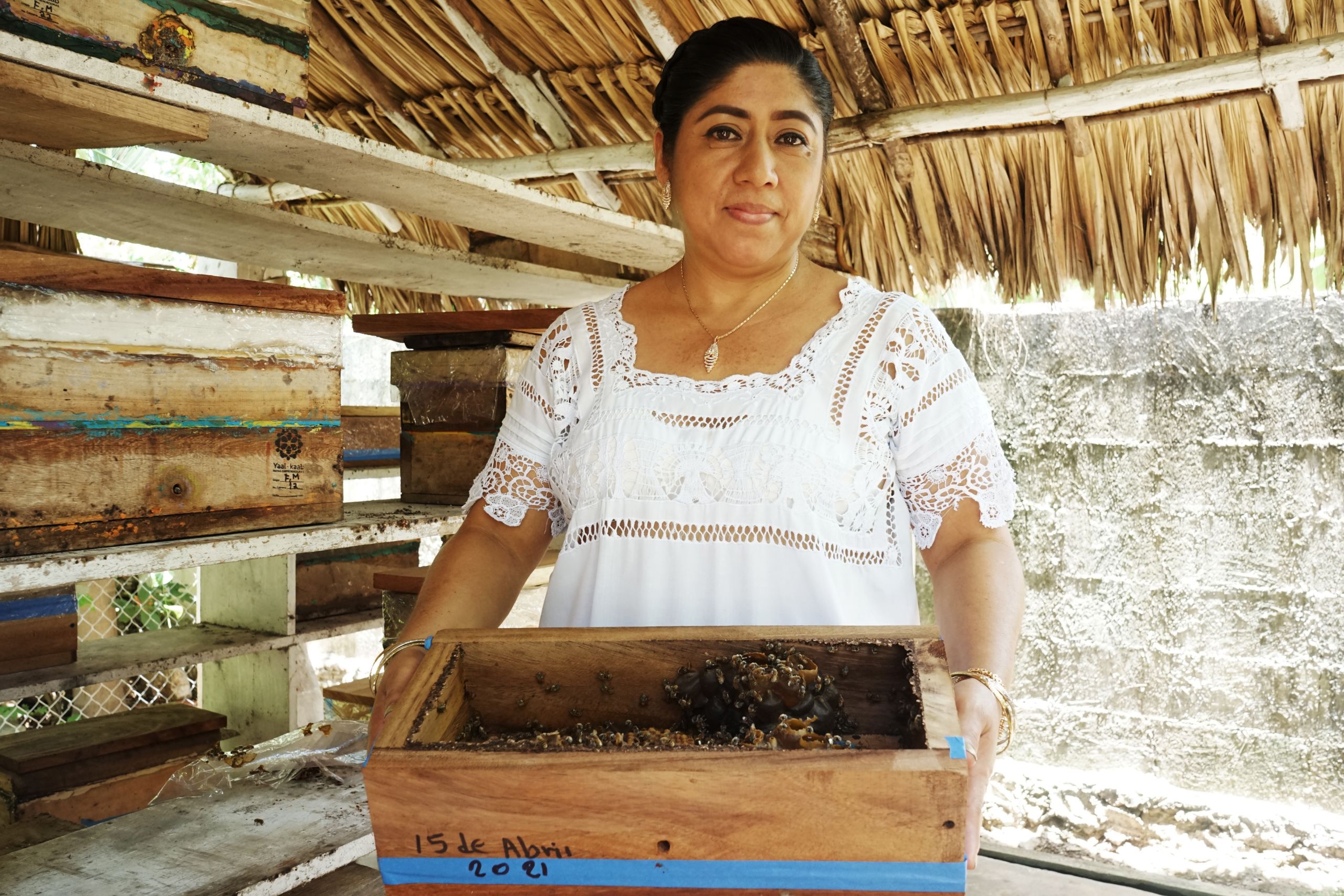
Soila Aquino holding one of the productive hives. Photo: © Claudia Novelo Alpuche/UNDP Mexico, SGP Mexico.

A box where the the hives of the Melipona beecheii are kept. Photo: © UNDP Mexico, SGP Mexico, Claudia Novelo Alpuche
A box where the the hives of the Melipona beecheii are kept. Photo: © UNDP Mexico, SGP Mexico, Claudia Novelo Alpuche


Soila Aquino holding one of the productive hives. Photo: © Claudia Novelo Alpuche/UNDP Mexico, SGP Mexico.
Soila Aquino holding one of the productive hives. Photo: © Claudia Novelo Alpuche/UNDP Mexico, SGP Mexico.
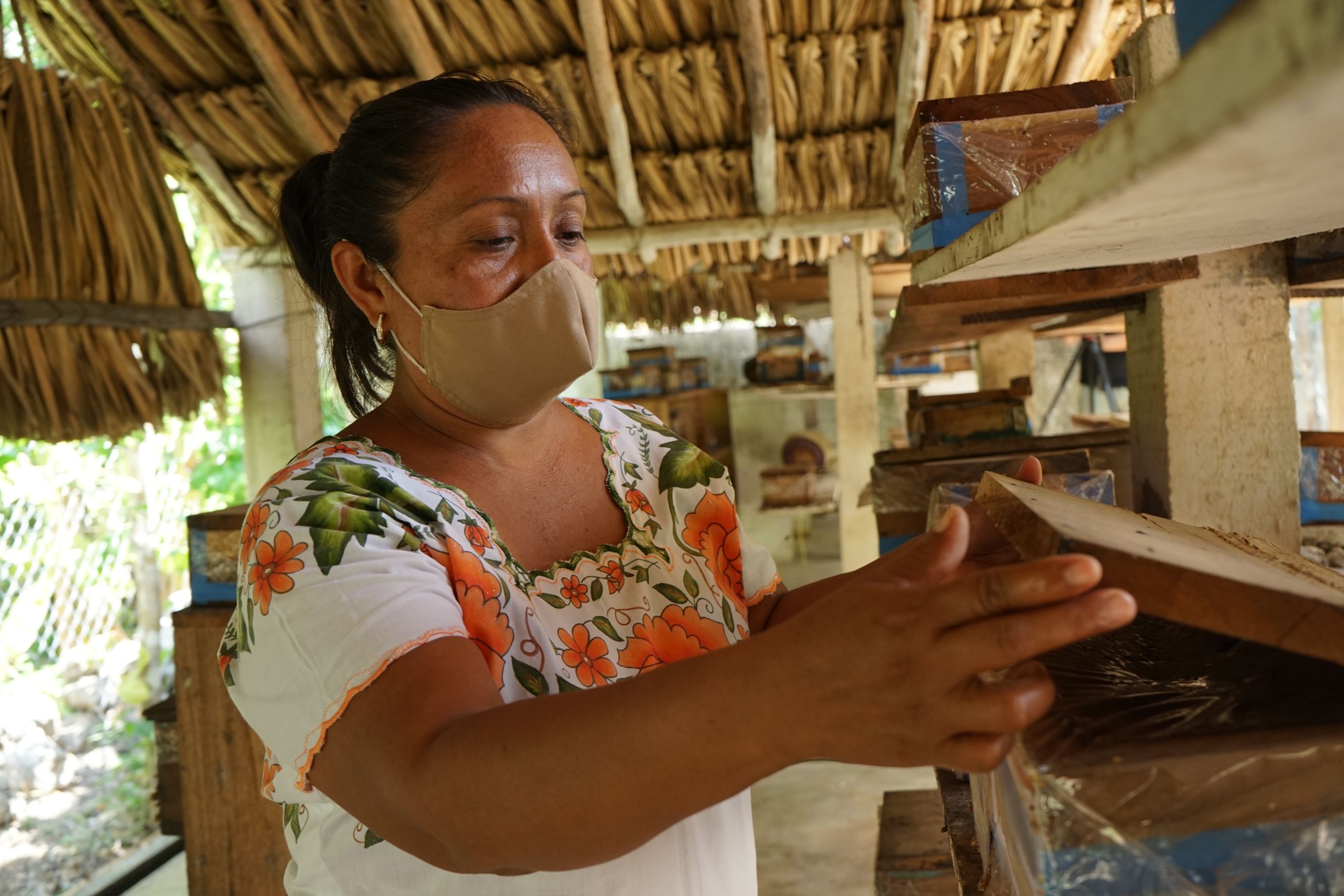
Teresita de Jesús Hau Jiménez opening a box with a hive of stingless melipona bees. Photo: © UNDP Mexico, SGP Mexico, Claudia Novelo Alpuche
Teresita de Jesús Hau Jiménez opening a box with a hive of stingless melipona bees. Photo: © UNDP Mexico, SGP Mexico, Claudia Novelo Alpuche
Pollinating Change
In Mexico, SGP promotes beekeeping and meliponiculture with a comprehensive approach that includes promoting biodiversity conservation in the landscape that provides nectar and pollen: the Mayan forest.

Beekeeping serves to protect the surrounding jungle on the Yucatán Peninsula. Photo: © Andrea Egan/UNDP Mexico.
For 26 years, it has supported a network of 76 beekeeping projects with a territorial vision, through strategies that are designed by local communities themselves and promote mutual learning and scaling up.
For beekeeping, organic management and fair trade are supported to generate environmental and livelihood benefits.
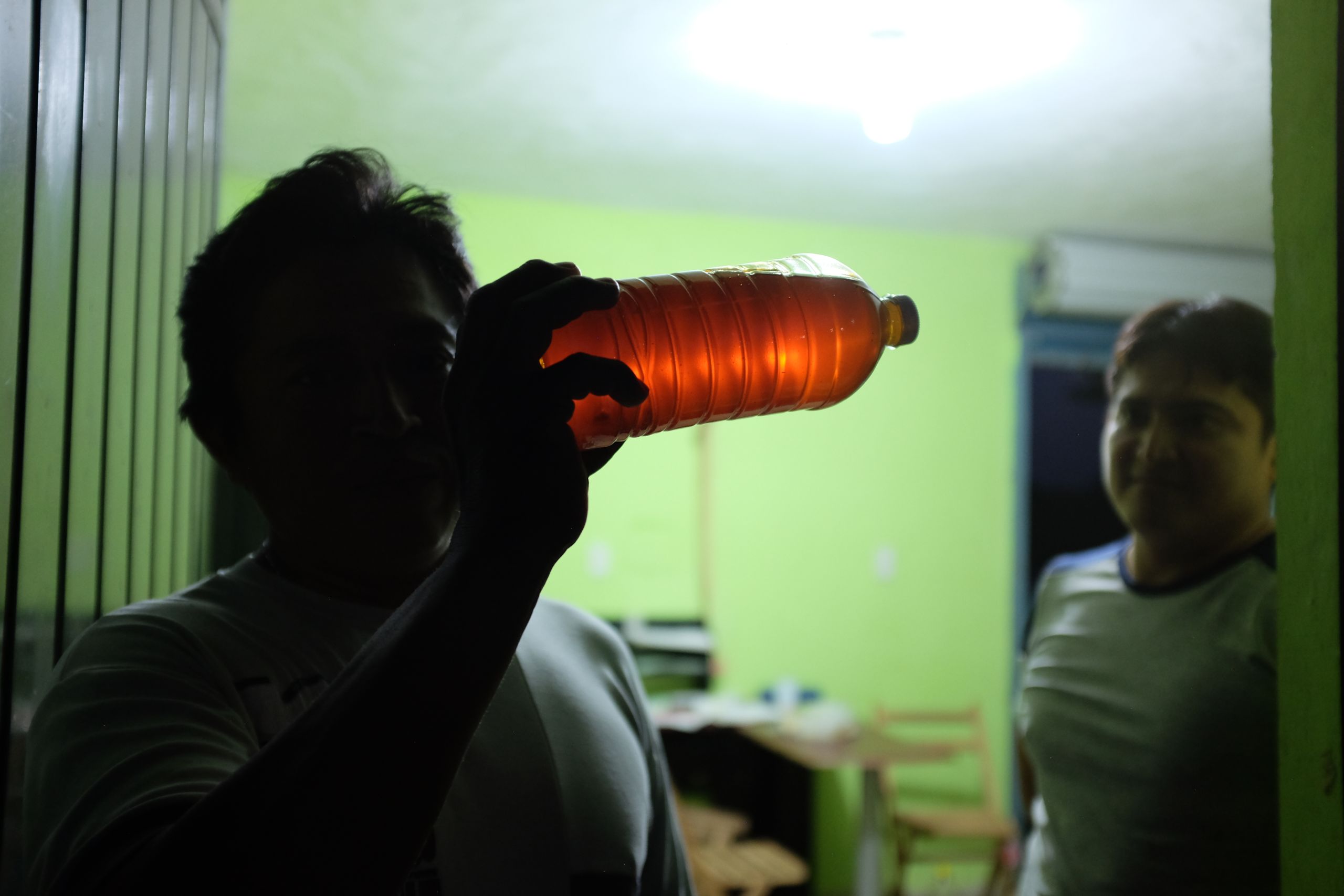
Members of the Sudzal Beekeeping Cooperative, also on the Yucatán Peninsulaand supported by SGP Mexico. Photo: © Andrea Egan/UNDP Mexico.
In the case of meliponiculture, support for this sector offers new economic opportunities to more than 300 women and men, while rescuing a species threatened by environmental degradation and deforestation.
In both sectors, SGP also promotes fair value chains, which make it possible to connect producers with responsible consumers.
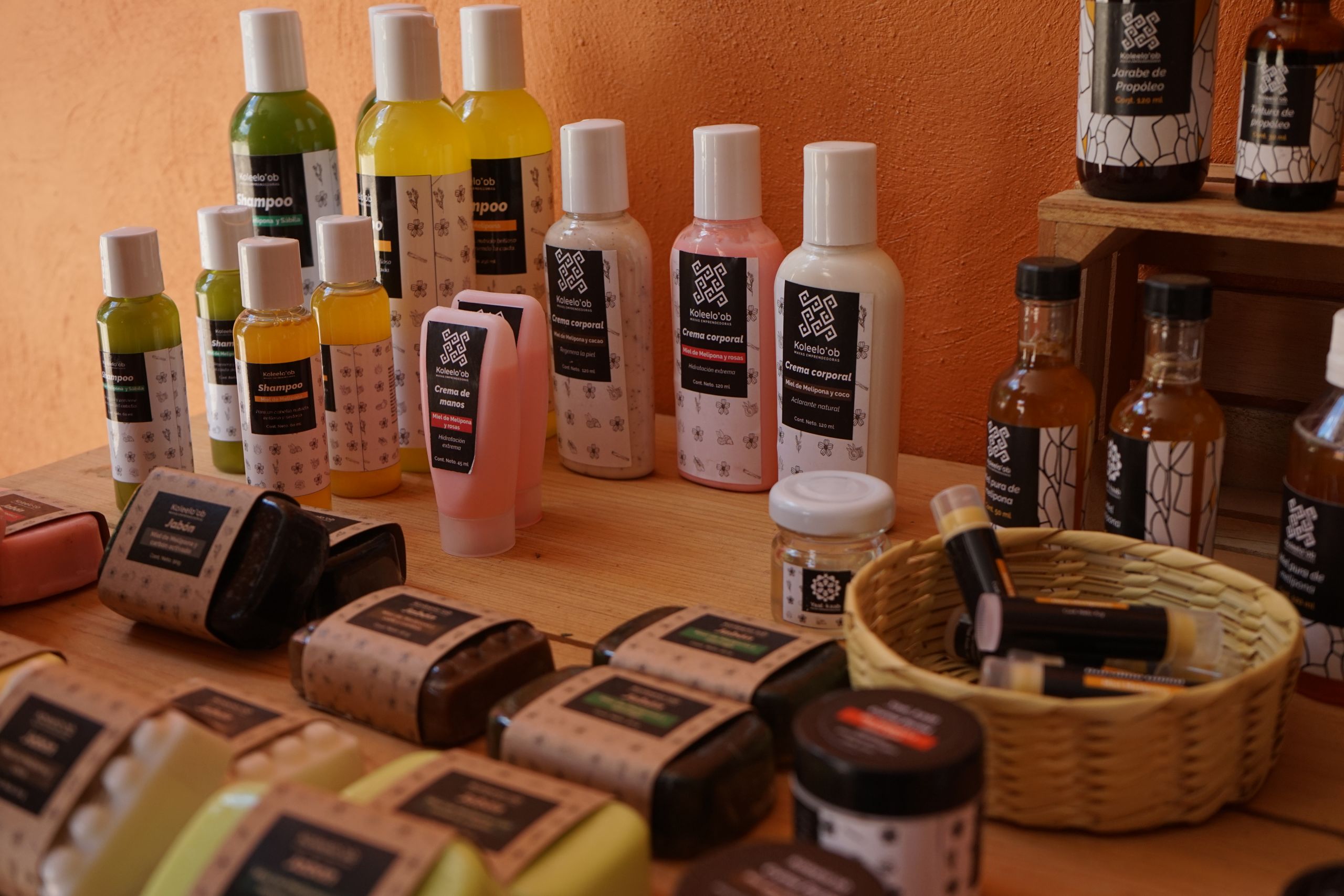
The various products made with melipona honey and sold under the Yaal-Kab brand. Photo: © UNDP Mexico, SGP Mexico, Claudia Novelo Alpuche
The products from the Yaal-Kab brand are the result of the work of over 90 empowered women who, in their quest for economic independence, have achieved a symbiotic relationship with their environment.
The bees not only benefit their protectors directly, but also generate better crops in the locations where their colonies are found, since their pollination promotes diversity among plants and improves the quality of the local fruits. In exchange, the women provide key habitat and protection for the rare indigenous bees.

Beekeeping serves to protect the surrounding jungle on the Yucatán Peninsula. Photo: © Andrea Egan/UNDP Mexico.
Beekeeping serves to protect the surrounding jungle on the Yucatán Peninsula. Photo: © Andrea Egan/UNDP Mexico.

Members of the Sudzal Beekeeping Cooperative, also on the Yucatán Peninsulaand supported by SGP Mexico. Photo: © Andrea Egan/UNDP Mexico.
Members of the Sudzal Beekeeping Cooperative, also on the Yucatán Peninsulaand supported by SGP Mexico. Photo: © Andrea Egan/UNDP Mexico.

The various products made with melipona honey and sold under the Yaal-Kab brand. Photo: © UNDP Mexico, SGP Mexico, Claudia Novelo Alpuche
The various products made with melipona honey and sold under the Yaal-Kab brand. Photo: © UNDP Mexico, SGP Mexico, Claudia Novelo Alpuche
To participate in the conservation of this wonderful species and learn about the work of these women, check out the various products available on their Facebook page or on their new website, which is being launched today to celebrate World Bee Day.
Contact information: Leticia Basulto Palmero, +52 999 222 6728, kuxtalil18@hotmail.com

SGP provides financial and technical support to civil society and community-driven initiatives that address global environmental issues while improving local livelihoods. Since 1994, it has supported more than 650 projects in Mexico in the areas of biodiversity, climate change and land degradation, among others.
For more details on SGP’s work in Mexico, visit the country programme’s website.
For information on SGP global portfolio, visit the global SGP website.
Story by: Abraham Puebla Castro, Ana Paula Canestrelli and Andrea Egan
Photos: © UNDP Mexico, SGP Mexico, Claudia Novelo Alpuche and others as noted
Header photo: © UNDP Mexico, SGP Mexico, Claudia Novelo Alpuche
Location: Yucatán, Mexico
